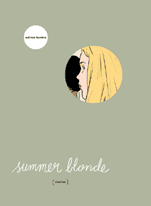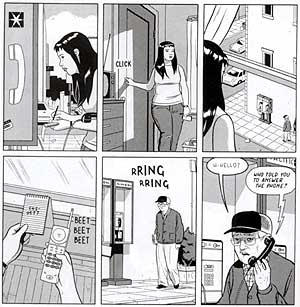
|
What makes Tomine's work difficult for some is the naturalism. He tells stories that feel more like short exposures of ordinary people's lives, rather than plot-heavy adventures or overt comedy. These stories don't begin and end so much as fade in and out. Tomine explores nuance of character as revealed by life's more typical crises: losing a job, having an annoying neighbor or flirting with someone you shouldn't. The best of the four tales in this collection, "Hawaiian Getaway," features Hillary Chan, a twenty-something child of Asian immigrants who loses her job and starts a downward spiral of guilt and self-loathing. Driven to distraction by a demanding, critical mother and a patronizing, "successful" younger sister, she begins making increasingly nasty prank calls to the payphone outside her window. Strangely, one of these results in a date with a decent guy. Will she see him again? It ends as she waits to find out.
 Hillary Chan prank calls an old man in Adrian Tomine's "Summer Blonde"
Hillary Chan prank calls an old man in Adrian Tomine's "Summer Blonde" |
I worry about Hillary in a way that I don't worry about other fictional characters. Tomine creates Hillary and the other protagonists with enough complexity to make her totally believable. She's not easy to like either, which is another thing that some readers may have a problem with. All four stories in "Summer Blonde" focus on rather negative people's inability to relate to others. "Alter Ego" tells of a young writer who begins neglecting his girlfriend for the sake of an even younger fan. In the titular tale, a lonely nerd fixates on a card shop girl who cheats on her boyfriend. Lastly, "Bomb Scare" gets right to the heart of being socially irrelevent in high-school. Each story reveals the secret life of the sad and alienated. If anything, the book can be criticized for a kind of thematic stasis. Each story feels like different versions of the same thing. But for some, that thing is their life.
Tomine's drawings cap the naturalist style of the stories. He goes strictly for realism, using a fine pen to get all the details. You can even read the menu board behind the coffee counter. Angles, framing, and pace are all, for better or worse, at the service of the characters and story. While he may not win awards for graphic innovation, Tomine has a real talent for easy comix storytelling.
It would be too bad if the ambiguity and sadness of "Summer Blonde" scared you off. Adrian Tomine won't entertain you with a lot of snappy tricks. He's on to something that other comix artists haven't captured — a slacker generation growing older but not wiser.
"Summer Blonde" will be available on July 22 at anyplace that sells smart books
TIME.comix will be on holiday for a week until July 16.
